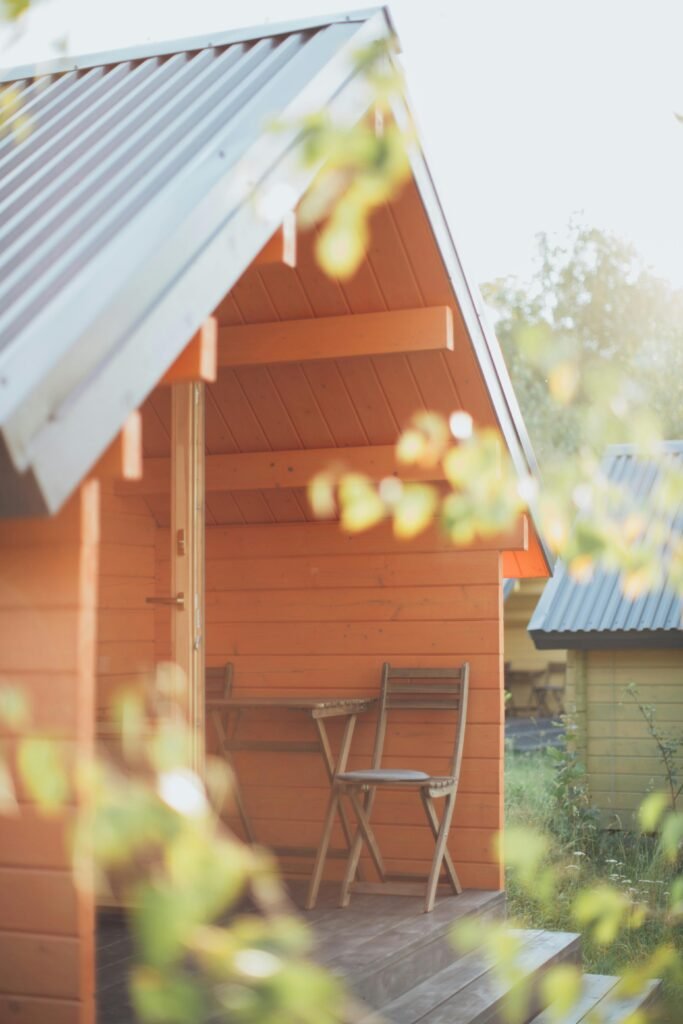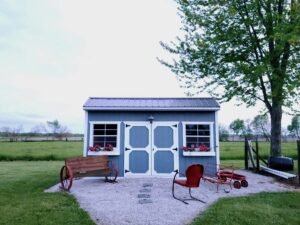The Environmental Benefits of Wooden Sheds: Sustainable Solutions for Outdoor Storage

Introduction
In the present era, with increasing awareness about environmental issues, our choices carry considerable weight, irrespective of their scale. This is particularly true regarding more substantial investments, such as outdoor storage solutions. Wooden sheds emerge as a beacon of sustainability, offering practical functionality and tangible environmental benefits. In this comprehensive exploration, we delve into the myriad advantages of wooden sheds from an ecological perspective, shedding light on their role in sustainable living and outdoor storage solutions.
Quick Tips
 Before we delve into the detailed analysis, let's consider some quick tips to guide your decision-making process when opting for wooden sheds:
Before we delve into the detailed analysis, let's consider some quick tips to guide your decision-making process when opting for wooden sheds:
- Choose Responsibly Sourced Wood: Examine sheds that carry certification from respected bodies like the FSC or the Programme for the Endorsement of Forest Certification (PEFC). The wood used to construct these huts comes from sustainable forestry practices. These certifications guarantee that the wood originates from forests that are responsibly managed to support biodiversity and conservation activities.
- Prioritize Maintenance: To maximize the environmental benefits of your wooden shed, prioritize proper maintenance. Regular treatments such as staining or painting protect the wood from moisture and decay and extend the shed's lifespan, reducing the need for replacement and minimizing waste.
- Consider Insulation Properties: Use wood's natural insulation properties when designing your shed. Adequately insulated wooden sheds can effectively control temperature fluctuations, diminishing the necessity for extra heating or cooling mechanisms and decreasing energy usage.
- Explore Customization Options: Discover the adaptability of wooden sheds by exploring personalized choices that align with your individual preferences. Whether you need an extra storage room, a functional workshop, or a serene hideaway within your outdoor space, wooden sheds offer the flexibility to cater to your needs while promoting eco-friendly practices.
Sustainable Sourcing of Wood
Wooden sheds pave the way for sustainability from the source of wood sourcing. Sustainable forestry practices play a pivotal role in ensuring that wood is harvested in a manner that maintains the health of forests and ecosystems. Selective logging, reforestation, and biodiversity protection are integral to sustainable forestry.
Certifications from organizations like the FSC or PEFC provide consumers with assurance that the wood used in their sheds comes from responsibly managed forests. These certifications require adherence to strict environmental, social, and economic standards, including protection of endangered species, respect for indigenous rights, and support for local communities.
By opting for sheds constructed from sustainably sourced wood, consumers contribute to preserving forests and mitigating deforestation—an essential strategy in combating climate change. Moreover, backing sustainable forestry methods is crucial in upholding ecosystem services like purifying water, stabilizing soil, and sequestering carbon. These services are essential for ensuring environmental sustainability.
Carbon Sequestration
 One of the wooden sheds' most significant environmental benefits is their carbon sequestration capacity.
One of the wooden sheds' most significant environmental benefits is their carbon sequestration capacity.
In contrast to materials like plastic or metal, wood operates as carbon-neutral, implying it retains carbon instead of releasing it. Trees take in carbon dioxide from the air as they grow, integrating carbon into their structure through photosynthesis.
When wood is used for construction, the carbon remains sequestered within the wood, even as it's fashioned into various products such as wooden sheds. This carbon storage process persists throughout the shed's lifespan, effectively drawing carbon dioxide out of the atmosphere and helping to alleviate the greenhouse effect.
Moreover, when sustainably managed forests are replanted after harvesting, the carbon sequestration cycle continues, further contributing to environmental sustainability. Choosing wooden sheds enables individuals to participate in the carbon cycle, engaging with a natural process that helps mitigate climate change by reducing greenhouse gas levels in the atmosphere.
Biodegradability and Reduced Environmental Impact
Wooden sheds stand out due to their ability to decompose naturally, setting them apart from synthetic alternatives such as plastic or metal.
When wooden sheds are disposed of properly, they gradually decompose over time, adding nutrients to the soil and contributing to the natural breakdown process. This characteristic minimizes environmental harm at the end of the shed's usage and promotes a circular economy model, emphasizing resource efficiency and waste reduction. Unlike materials that persist in landfills for extended periods, wooden sheds transform into organic matter, leaving minimal waste remnants.
Additionally, utilizing wood diminishes the dependence on finite resources and fossil fuels commonly linked with the manufacturing of alternative materials for sheds. By opting for wooden sheds, consumers promote resource efficiency and reduce their ecological footprint, aligning with the principles of sustainable living and environmental stewardship.
Energy Efficiency and Thermal Properties
Wooden sheds offer excellent insulation properties, providing energy efficiency benefits for the structure and its contents. Wood naturally regulates temperature, helping to maintain a comfortable environment within the shed throughout the year. This innate insulating quality helps decrease the requirement for extra heating or cooling mechanisms, thus reducing energy usage and the resulting greenhouse gas emissions.
Moreover, wooden sheds, such as solar panels, can be constructed with renewable energy sources in mind. Integrating solar power into shed design further enhances energy efficiency and promotes sustainable living practices. By harnessing the power of renewable energy, wooden sheds contribute to a greener and more environmentally conscious future, reducing reliance on non-renewable energy sources and mitigating climate change.
Customization and Longevity
 Wooden sheds provide unmatched versatility in customization and design, empowering customers to personalize their sheds according to their unique requirements and desires. Whether you need an extra storage room, a workshop for DIY endeavors, or a charming hideaway in your garden, wooden sheds can be modified to serve many purposes.
Wooden sheds provide unmatched versatility in customization and design, empowering customers to personalize their sheds according to their unique requirements and desires. Whether you need an extra storage room, a workshop for DIY endeavors, or a charming hideaway in your garden, wooden sheds can be modified to serve many purposes.
From adjustable shelving to customizable layouts, wooden sheds' versatility enables creative solutions that maximize space while minimizing environmental impact. Moreover, with proper maintenance and care, wooden sheds boast impressive longevity, lasting for decades or generations with minimal upkeep.
Routine maintenance tasks like staining or painting are crucial in safeguarding the wood against moisture, decay, and pests. This not only prolongs the shed's lifespan but also maintains its structural strength and visual attractiveness. Unlike alternative materials that may degrade over time, wooden sheds retain their value and functionality over the long term, making them a sustainable investment for outdoor storage solutions.
Environmental Comparison of Shed Materials
| Environmental Aspect | Wooden Sheds | Plastic Sheds | Metal Sheds |
| Sourcing of Raw Materials | Sustainably sourced wood certified by FSC or PEFC | Typically made from non-renewable fossil fuels (petroleum) | Production involves energy-intensive extraction and processing of ores (steel or aluminum) |
| Carbon Sequestration | Wood acts as a carbon-neutral material, sequestering carbon dioxide | Plastic production emits greenhouse gases; sheds do not sequester carbon | Metal production emits significant carbon dioxide; sheds do not sequester carbon |
| Biodegradability | Biodegradable; decomposes naturally at the end of the lifespan | Non-biodegradable; persists in landfills for centuries | Non-biodegradable; may release toxic substances when decomposing |
| Energy Efficiency | Natural insulation properties: reduce energy consumption | Poor insulation may require additional heating or cooling | Conducts heat, resulting in higher energy consumption |
| Longevity and Maintenance | Long lifespan with proper maintenance (decades); periodic staining or painting | Prone to degradation and discoloration; may require replacement within a few years. | Susceptible to rust and corrosion; may require frequent maintenance to prevent deterioration. |
This table comprehensively compares the environmental aspects associated with different shed materials, highlighting the superior eco-friendliness of wooden sheds.
Natural Resource Conservation
Wooden sheds contribute to the conservation of natural resources by utilizing wood, a renewable and biodegradable material. Unlike non-renewable resources such as petroleum-based plastics or metals extracted from ores, wood is derived from sustainably managed forests that can be replenished through responsible forestry practices.
By choosing wooden sheds, consumers support preserving biodiversity and ecosystem services provided by forests. Forests are crucial in regulating the climate, purifying air and water, and providing habitats for countless species. By promoting the sustainable use of wood, wooden sheds help maintain the health and resilience of forest ecosystems, ensuring their continued benefits for present and future generations.
Reduced Environmental Footprint
Wooden sheds offer less environmental footprint than synthetic materials like plastic or metal. Wooden sheds emit fewer greenhouse gases and pollutants throughout their lifecycle, from production to disposal. The manufacturing process for wood products generally requires less energy and generates fewer emissions than plastic or metal production processes, which involve energy-intensive extraction, refining, and manufacturing.
Moreover, wooden sheds can be recycled or repurposed at the end of their lifespan, reducing waste and environmental impact.
Wood has the potential to be salvaged and repurposed in alternative construction endeavors or transformed into biomass energy. This supports the circular economy concept, wherein resources are effectively reused and recycled.
Aesthetic and Psychological Benefits
 In addition to their environmental advantages, wooden sheds offer aesthetic and psychological benefits that contribute to overall well-being and quality of life. Wood's natural warmth and beauty create a harmonious connection with outdoor environments, enhancing the visual appeal of backyard spaces.
In addition to their environmental advantages, wooden sheds offer aesthetic and psychological benefits that contribute to overall well-being and quality of life. Wood's natural warmth and beauty create a harmonious connection with outdoor environments, enhancing the visual appeal of backyard spaces.
Research has demonstrated that being in contact with natural elements such as wood can benefit mental well-being and help alleviate stress. Wooden sheds offer a serene sanctuary, allowing people to detach from the fast-paced routine of everyday life and promoting a feeling of calmness and rejuvenation amidst outdoor environments.
By incorporating wooden sheds into their outdoor spaces, consumers benefit from practical storage solutions and enjoy the therapeutic effects of nature's beauty, promoting holistic well-being and environmental stewardship.
Promotion of Sustainable Practices
Wooden sheds serve as a tangible example of sustainable living practices, inspiring others to make eco-conscious choices in their own lives. By showcasing the environmental benefits of wooden sheds and their role in promoting sustainability, consumers can influence broader attitudes and behaviors toward resource conservation and waste reduction.
Moreover, the demand for wooden sheds encourages innovation and investment in sustainable forestry management and wood product manufacturing. As consumers increasingly prioritize environmental considerations in their purchasing decisions, manufacturers are incentivized to adopt greener practices and develop eco-friendly products that meet consumer demand.
Overall, wooden sheds promote a more sustainable and environmentally conscious approach to outdoor living. From their renewable and biodegradable materials to their aesthetic and psychological benefits, wooden sheds embody eco-friendly design principles and responsible consumption, paving the way towards a greener and more sustainable future.
Conclusion
In summary, wooden sheds present an environmentally friendly option for outdoor storage, providing numerous ecological advantages that resonate with the values of eco-friendly living. From their role in supporting sustainable forestry practices to their carbon sequestration capabilities and biodegradability, wooden sheds exemplify the potential of natural materials in promoting environmental sustainability.
By opting for wooden sheds, consumers invest in durable and customizable storage solutions and contribute to preserving forests, reducing carbon emissions, and promoting a circular economy. In an age where sustainability is paramount, choosing wooden sheds represents a conscious step towards a greener and more environmentally responsible future.
Wooden sheds offer a harmonious blend of functionality, durability, and environmental stewardship. Their ability to sequester carbon, biodegrade naturally, and provide energy-efficient insulation sets them apart as a sustainable choice for outdoor storage. Moreover, with proper maintenance and care, wooden sheds can last for decades, providing long-term benefits for consumers and the environment.
As we strive to lessen our ecological footprint and embrace more environmentally friendly lifestyle options, the careful selection of materials for sheds becomes increasingly important. Wooden sheds stand as a testament to the potential of natural materials in promoting environmental sustainability, offering consumers an opportunity to impact their purchasing decisions positively.
Every choice matters in the journey towards a more sustainable future. By choosing wooden sheds, consumers enhance their outdoor living spaces and contribute to preserving our planet for future generations. Let us embrace wooden sheds' inherent beauty and sustainability as we embark on a greener tomorrow.
- Crafting Affordable Dream Sheds: Cost-Effective Solutions for You
- Affordable Outdoor Storage: Budget-Friendly Shed Alternatives
- Dont Break the Bank: Top Picks for Cheap Shed Options
- Crafting Cost-Effective Solutions: Affordable Shed Construction Explained
- Empowering Your Space: Tips for Managing Shed Construction Budget
- Unveiling Shed Building Cost Estimator: Your Budgets Best Friend
- Revamp Your Shed: Creative Shed Base Ideas for Your Outdoor Oasis
- Elevate Your Shed Game: Unveiling the Magic of Concrete Foundations
- Budget-Friendly Solutions: Exploring Prefab Shed Prices
- Step-by-Step Gravel Shed Foundation Building Made Easy

Leave a Reply
You must be logged in to post a comment.